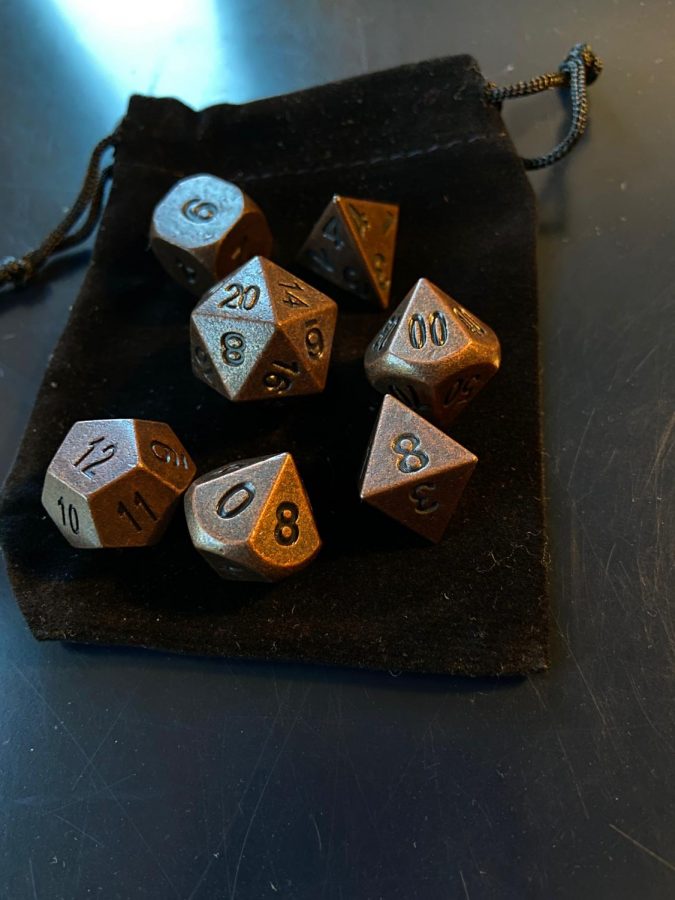D&D: Not just for nerds
October 13, 2020
These unusual die are just a tiny facet of the endlessly imaginative game Dungeons and Dragons Club founder sophomore Nick Sapalaran hopes to promote amongst the student body. Enthusiasts and newcomers alike are able to join the online servers set up by the club and just enjoy the never ending twists and turns of this magical experience.
Sophomore Nick Sapalaran, founder and President of the Dungeons and Dragons (D&D) Club, insists that their club isn’t just for nerds.
“Well okay, I guess we’re majority nerds,” they said. “But anybody else is welcome to join; it doesn’t really matter who you are — whoever likes fantasy and role-playing.”
Luckily for the D&D not-nerds, Nick, who started the club last year, doesn’t anticipate distance learning posing much of a problem for the club; in fact, D&D has actually grown in size this year.
For those unfamiliar with D&D, the game doesn’t require many physical objects — just character sheets and dice, both of which can be found online on D&D websites.
For those completely unfamiliar with D&D, it’s a role-playing and adventure game where players go on imaginary “quests” in teams, led by a “dungeon master” in a fantasy setting — confusing, yes, but Nick says that new players tend to pick it up after a couple of games.
“The thing with D&D is that a lot of it is theater of the mind,” Nick said. “You don’t necessarily need to look at something to be able to play, but it’s obviously a lot more fun in real life.”
“Basically D&D’s just theater improv, but a board game,” sophomore Logan Kim, a new club member, said. “The rules are there as kind of a skeleton, but really you can do whatever you want.”
Logan said that he’s drawn to the game precisely because it’s so open-ended.
Nick did mention that one challenge they foresee is communicating and coordinating with club members; it can be hard to get people to meet at lunch because they’re at home, and everybody has extracurriculars and homework to do, so it can be difficult to find time to play.
Typically, the group would play Thursdays at lunch in science teacher Heather Laederich’s room (Nick said that in addition to being one of their favorite teachers, Laederich is well endowed with “big tables” in her classroom, which are handy for D&D). But unfortunately, those Thursday meetings have since been scrapped in favor of a solution more suited to distance learning.
Nick appointed five dungeon masters — “DMs,” they called them, with a certain swagger — to lead and host games every day of the week on the club Discord server, hoping that it’ll be easier for club members to find time to enjoy the game.
Logan, as a dedicated DM himself (he once spent three weeks devising a campaign and storyline), said that the hardest part of the job is to encourage new players to use their imaginations.
“It’s very difficult to get people to improvise because they don’t want to disrupt the continuity of the world,” he said. “But the thing is if they break that continuity, I can always reshape it as the DM.”
According to Logan, many of the game’s best moments come from the imaginative and unexpected twists each player contributes to the storyline. He provided examples of these instances, although most were “not safe for work.” But that’s what the game’s all about, he said — just having fun.
“I absolutely love D&D, and I love seeing other people also love D&D,” Nick said. “For me, it’s the role-playing and story-telling aspects of D&D that I really enjoy. I find it really fun to imagine myself as a cool fictional character fighting monsters, solving puzzles and also getting attached to a story.”
Nick reiterated that the club is open to anybody: nerds and not-nerds, people who know the rules and people who don’t.
“Experience doesn’t really matter for our club,” Nick said. “Our members are super friendly in general, so even if you don’t play, we’d be happy to teach you.”
Logan — after showing off an impressive collection of D&D dice — did poke some fun at his fellow D&Ders.
“It’s a very nerdy game,” he said. “There’s really not much else to say about it. We’re a bunch of nerds.”


